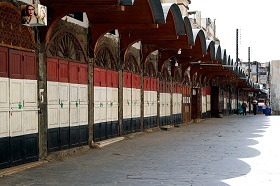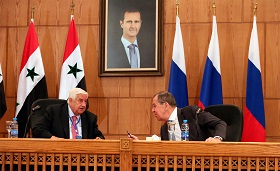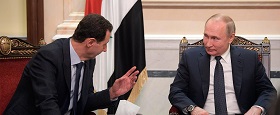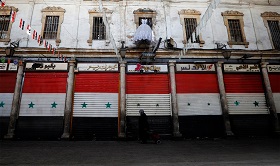In October 2020, as the media reported Russia’s aerospace forces resuming their strikes against the local armed opposition, Turkey relocating its observation posts and Syrian militants fighting in Nagorno-Karabakh, the global community once again turned its attention to the events in Idlib.
The preferable scenario for settling the Idlib problem appears to be a compromise, in essence, pacification adapted to the local specifics. The scenario is to be based on the four “Ds”: deradicalisation of the opposition, deideologisation of the regional elite, demilitarisation of the Idlib zone and, decentralisation. In practice, this could imply adopting a separate socioeconomic programme for rebuilding Idlib, involving international financing and creating the conditions for vertically integrating the regional into the pan-national elite following disbandment of the Syrian Salvation Government.
As a leading external actor in the Syrian conflict, Russia has the ability to now contribute to bringing a peaceful settlement closer in Idlib by 1) pointing the Syrian authorities toward pacification instead of a blitzkrieg; 2) advancing, jointly with Turkey among other actors, the involvement of the regional elite in the inclusive Syrian peaceful process; 3) continuing its military support for Syria’s government forces with a view to preventing provocations by Idlib radicals intended to undermine the prospects for a peaceful settlement.
Idlib remains valuable for Turkey, yet, unlike the security zone in Northern Syria, it cannot be called a “red line” in the architecture of Turkey’s national interests that Ankara intends to protect to the bitter end.
In October 2020, as the media reported Russia’s Aerospace forces resuming their strikes against the local armed opposition, Turkey relocating its observation posts, and Syrian militants fighting in Nagorno-Karabakh, the global community once again turned its attention to the events in Idlib. It is important to consider possible development scenarios in the light of both Idlib’s distinctive features and of those characteristics it has in common with other territories not controlled by the Syrian authorities, in the light of the balance of power within the Idlib “pocket”, in the light of the interests Turkey and other external forces have there, and in the light of modalities of military or peaceful settlement and Moscow’s actions.
Is Idlib a “Unique Rebellious Province”?
At first glance, like the territory of the Kurds’ Autonomous Administration of North and East Syria (AANES), Idlib seems to have formed a military conflict economy existing in parallel with the official Syrian economy controlled by the Syrian government. Unlike the oil-rich Kurdish regions, which are also Syria's “breadbasket”, however, Idlib has no natural resources at all. Before the war, Idlib was a poorly developed province working in traditional agriculture, mostly olive-growing. Consequently, compared to the AANES, Idlib was far more vulnerable to the actions of external actors and Damascus’s ambitious plans to use force to restore Syria’s territorial integrity. Not only did Idlib fail to become a successful project of the Syrian opposition (which could not but fail for objective reasons), it became hostage to foreign aid.
Like Syria in general, Idlib shows signs of a humanitarian crisis. While the 2004 census put Idlib’s population at a little over 1,258,000, as of August 7, 2020, the local population swelled to 4.1 million, 2.7 million of them internally displaced persons from other governorates and 2.8 million of them in need of food and medications (reported by the UN Office for the Coordination of Humanitarian Affairs). Another mass exodus of non-combatants into Idlib took place following the Syrian Arab Army’s (SAA) successful offensive in December 2019 – March 2020. Since foreign aid is politicised (see, for instance, the highly publicised story of American and British NGOs halting deliveries of humanitarian aid from Turkey through the Bab al-Hawa border crossing in September 2018 in an attempt to strip Idlib radicals of their benefits), it is easy to predict that an “overnight” change of the status quo in favour of Damascus will result in restricting donor aid and, as a consequence, in a humanitarian disaster.
Idlib became a “pocket” for the opposition “squeezed” between areas liberated by the SAA and Turkey. At the same time, unlike the security zone in the North, which is de jure governed by the “Syrian provisional government” but is de facto controlled by Ankara, in Idlib, much to the Turks’ displeasure, the key role is still played not by the militants from the National Front for the Liberation of Syria (NFL) loyal to Turkey, but by the recalcitrant jihadists from Hay’at Tahrir al-Sham (HTS) (banned in Russia as a terrorist organisation), which previously had ties with Al-Qaeda (also banned in Russia as a terrorist organisation).
Local reconciliations (or pacifications) in Idlib appeared impossible in principle: this region had absorbed intransigent opposition members from the South of Syria and from the Damascus region, and they had nowhere to go since Turkey had always been set against letting unpredictable radicals on to its own territory. Idlib jihadists flatly rejected reconciliation with the Syrian authorities, admitting only that civilians had been forced to take part, but they never agreed to such participation on the part of their comrades-in-arms, whom they spitefully dubbed “frogs” for their willingness to defect to the government camp. The situation began to change a relatively short time ago when radical groups left Idlib for conflict-riven Libya and Nagorno-Karabakh. This situation prompted intensified internationalisation of the “Idlib dossier”, while it also meant that further developments were volatile and had an element of chance to them. Heightened internationalisation is also due to the maximum number of external actors turning their attention to the Idlib “pocket”. Idlib alone remains a matter of concern for China in Syria since there are Uighur radicals from the Turkistan Islamic Party in the West of the governorate.
The “Layer Cake” of the Armed Opposition: Radicals and “Businessmen”
Taking as our axiom that any way out of the Idlib impasse is going to be difficult, we should say a few words about local armed groups and management of the Idlib economy, since both factors can shed some light on certain promising settlement modalities.
Initially, Idlib’s administrative system was based on the decentralisation principle, which is reminiscent of the autonomous architecture of the local authorities in Rojava (Syrian Kurdistan). 144 municipal councils were formed, offering a wide range of services from managing bakeries to maintaining roads and collecting rubbish. They had the signal status of direct recipients of foreign aid. As one humanitarian worker quipped, “If [in Idlib – I.M.] you’re not a guy with a gun … then your connection to power is through [humanitarian – I.M.] assistance”. So Idlib’s decentralisation is really different from the governance system established in the Kurdish region in that the former is excessively dependent on foreign support while having no economic programme of its own and no transparency.
The situation in Idlib is characterised by the dominance of local economic heavies combined with the people’s wariness when it comes to introducing an Islamic way of life (Sharia), which prompted the ideologues of the An-Nusra Front (banned in Russia as a terrorist organisation) after seizing the provincial centre in March 2015 to refrain from following the example of ISIS (banned in Russia as a terrorist organisation), so, instead of proclaiming an Islamic “Emirate”, they opted for more flexible tactics. They proclaimed their desire to take various interests into account without permitting violations. At the same time, the principle of “invitation” or “Islamic messianism” entailed ideological indoctrination of the population through face-to-face, in-person communication and public condemnation campaigns against smoking and wearing secular clothes.
The ideologues of the HTS that took over from an-Nusra consolidated their military control over Idlib in January 2019 and remained pragmatic. HTS leader Abu Mohammad al-Julani said that their priority was to preserve a single secular administration in Idlib, referring to the umbrella Syrian Salvation Government (SSG) founded on November 2, 2017; it consisted of both HTS supporters and independent technocrats. Despite the hardliners from Egypt and Jordan, HTS warlords from among the Syrians began to position themselves as businessmen viewing control over Idlib as an economic project (while, in reality, it is a means for personal enrichment).
The negative aspect of the HTS “commercialisation” consisted in attempts to take over transit trade crossing the border at Bab al-Hawa and deliveries of Turkish oil by the monopolist company Watad Petroleum. On May 11, 2017, the HTS announced it was establishing the Public Institution for Monetary Regulation and Consumer Rights Protection charged with monitoring financial transactions. Most such transactions were based on hawal principles (a trust-based system of informal payments between brokers and traders) and were carried out through the local monetary financial “hub”, the town of Sarmadam which is in the immediate vicinity of the Bab al-Hawa border crossing.
The HTS’s claims to economic dominance repeatedly prompted countermeasures by Idlib’s heavies, who used the discontent of the local populace with their low quality of life. In October-November 2019, they managed to bring protesters to the streets demanding that both the SSG and Abu Mohammad al-Julani resign. Although the protesters’ demand for a “government” reshuffle were met, HTS militants took by assault the town of Kafr Takharim, whose residents refused to pay the tax on manufacturing olive oil. The Covid-19 pandemic became yet another challenge: although the HTS supported the lockdown measures imposed by the SSG, many rank-and-file militants refused to obey and continued their Friday prayers, which make it impossible to maintain social distancing.
What is Idlib for Turkey: A Red Line or a Pawn in a Big Game?
Ensuring the security of Turkey’s southern borders and countering Kurdish separatism have been and remain Turkey’s unconditional priorities. In that sense, retaining control over the security zone in the North and preventing Syrian Kurds from a military retaliation are clearly more important than Turkey’s presence in Idlib: should need be, Turkey is ready to make concessions over the governorate in exchange for boosting Ankara’s positions in the North and pushing Kurdish self-defence units away from the border.
Does this mean that Turkey is already prepared to sacrifice Idlib? Certainly not, and Operation Spring Shield proves it: on February 27 – March 6, 2020, the Turkish military put a stop to a local SAA offensive and subsequently increased its forces in Syria. Foreign experts believe that, between February 2 and October 21, 2020, Turkey moved 10,615 units of military equipment and military vehicles to Idlib. Given its domestic economic difficulties related to the Covid-19 pandemic, Turkey is not prepared to take in new waves of Idlib refugees if Damascus gains a rapid military victory. This is especially true since those refugees could include intractable jihadists capable of causing a wave of terror attacks in Turkey itself; the best-case scenario for Ankara is to transfer those people to various hotbeds of unrest (such as Libya and Nagorno-Karabakh).
Turkey’s apparent determination in Idlib is motivated to some degree by its desire to maintain what Russian columnists have dubbed “opposition conservation areas” in Syria. Tying those opposition forces to Turkey by economic means (against the backdrop of the US Caesar Act, the Turkish lira has replaced the Syrian pound in the security zone in the Syrian North and in Idlib), in its bargaining with Damascus, Moscow and Tehran on Syria’s future political makeup, Turkey’s leadership is banking on the “trump card of rebellious territories”. Information about Turkey’s efforts to form an alliance in Idlib that would include the “Syrian Corps” and other NFL elements, as well as “constructive” ones from the HTS has been leaked on a website with ties to the Syrian opposition, and this information should be considered in the same context.
Finally, Turkey’s leadership and Erdogan himself increasingly view the “Idlib question” through the lens of a difficult dialogue with Russia on the Libyan and Nagorno-Karabakh conflicts (on October 25, Russia’s Aerospace Force delivered a strike against the Syrian Corps militants in Idlib, which Russian media dubbed “Bakh for Karabakh” [1] ). Turkey has started relocating eight military observation posts in Idlib, as those posts had been blocked in an SAA-liberated area (the post in Murek was evacuated on October 19-20, 2020), which is not only for security reasons, but also due to Turkey’s desire to avoid a severe confrontation with Moscow in Syria. This would be against Ankara’s interest, given its support for Azerbaijan’s offensive in Nagorno-Karabakh.
To sum up, we can conclude that Idlib remains valuable for Turkey, yet, unlike the security zone in Northern Syria, it cannot be called a “red line” in the architecture of Turkey’s national interests that Ankara intends to protect to the bitter end.
A Military Scenario or a Political Compromise?
We do not discard the hypothetical possibility of the Syrian authorities regaining control of Idlib by military force with the aid from its allies, Russia and Iran, yet this scenario today appears unlikely. It would have highly negative consequences for Syrians themselves, prompting a local humanitarian disaster, chaos and a sharp increase in crime (as happened when the government forces defeated the opposition units in Syria’s South in the summer of 2018), and even forcing disjointed terrorist groups to flee to other districts in Syria.
The preferable scenario for settling the Idlib problem appears to be a compromise, in essence, pacification adapted to the local specifics. The scenario is to be based on the four “Ds”:
- deradicalisation of the opposition, (primarily HTS): this is possible once intransigent and “professional” militants, mostly foreign ones, withdraw from Idlib; this is the common point in the interests of foreign actors;
- deideologisation of the regional elite: this entails moving away from the ideas of Jihadism in favour of implementing a consensus programme for socioeconomic development, with both local interest groups and technocrats involved;
- demilitarisation of the Idlib zone: post-conflict integration of former militants into territorial law enforcement and municipal bodies;
- decentralisation: granting Idlib a special transitional status within a unified Syria.
In practice, this could imply adopting a separate socioeconomic programme for rebuilding Idlib, involving international financing and creating the conditions for vertically integrating the regional into the pan-national elite following disbandment of the Syrian Salvation Government.
Russia’s Role in Resolving the Idlib Problem
As a leading external actor in the Syrian conflict, Russia has the ability to now contribute to bringing a peaceful settlement closer in Idlib by 1) pointing the Syrian authorities toward pacification instead of a blitzkrieg; 2) advancing, jointly with Turkey among other actors, the involvement of the regional elite in the inclusive Syrian peaceful process; 3) continuing its military support for Syria's government forces to prevent provocations by Idlib radicals intended to undermine the prospects for a peaceful settlement.
1. This is a pun that resists translation: the last syllable in the word Karabakh, “bakh”, is an onomatopoeic Russian word meaning “kaboom” – translator’s note.








